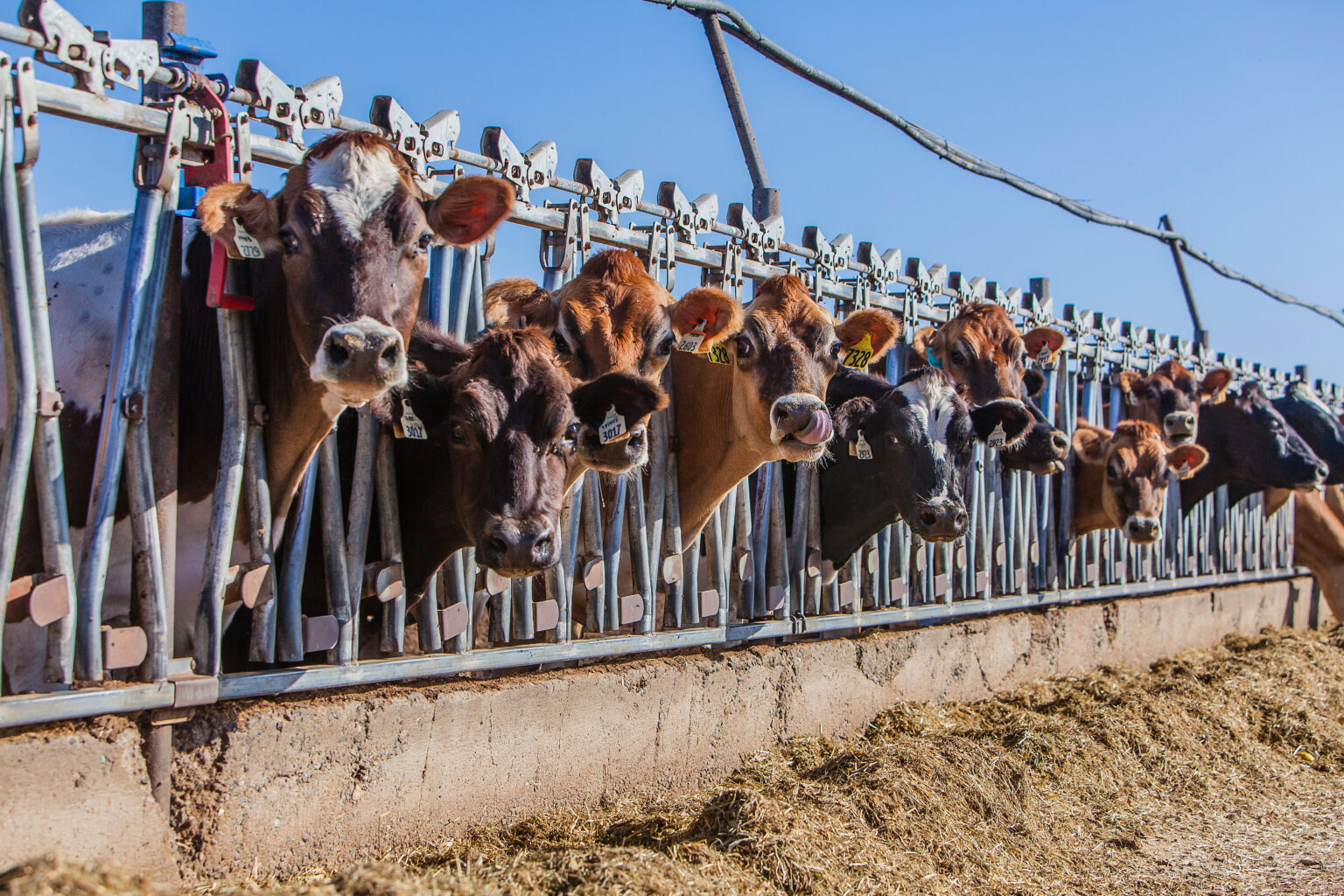Lobbyists for the world’s biggest meat companies have lauded a better than expected outcome at COP28, which they say left them “excited” and “enthusiastic” for their industry’s prospects.
U.S. livestock bosses reflected on the conference’s implication for their sector on a virtual panel, fresh from “sharing U.S agriculture’s story” at the climate summit last December.
Campaigners and climate scientists had hoped the summit – which was billed as a “Food COP” due to its focus on farming – would see governments agree to ambitious action to transform food systems in line with the goals of the Paris climate agreement.
But while more than 130 governments pledged to tackle agriculture’s carbon footprint, a slew of announcements and initiatives failed to set binding targets, or to broach the question of reducing herds of ruminant livestock such as cattle and sheep, which are agriculture’s largest driver of emissions.
In the online discussion, which was hosted by the trade outlet FeedStuffs, meat lobbyists groups made it clear they saw COP28 as a win.
The three representatives all said there had been widespread recognition at the Dubai summit that agriculture was a “solution” to climate change, despite livestock accounting for over 30 percent of anthropogenic methane emissions.
Outcomes at the summit were characterised as “a far more positive outcome than we had anticipated” by Constance Cullman, the president of the Animal Feed Industry Association (AFIA) – a US lobby group whose members include some of the world’s biggest meat and animal feed producers.
She added that this was the first time she had “felt that optimistic” after a “large international gathering like this one”.
Cullman also praised the UN Food and Agriculture Organisation (FAO)’s Global Roadmap to tackle the climate crisis and end hunger, which she described as “music to our ears”, stating that she particularly welcomed the report’s emphasis on “production and efficiency” over “looking at reduced consumption of animal protein”.
Academics described the FAO report’s failure to recommend cuts to meat-eating as “bewildering” in a March submission to the journal Nature Food.
According to a March paper, which surveyed more than 200 environmental and agricultural scientists, meat and dairy production must be drastically reduced – and fast – to align with the Paris Agreement.
The report concludes that global emissions from livestock production need to decline by 50 percent during the next six years, with “high-producing and consuming nations” taking the lead.
The FAO told DeSmog in a statement that its roadmap took a “balanced” approach to animal agriculture, saying that its report had “acknowledged the importance of livestock for poor people in traditional agrifood systems” and referenced the need for dietary shifts.
“We believe that some comments on the change in diets and the role of animal products in them are either misinformed because people have not properly read the Roadmap report, or deliberately disingenuous for the sake of feeding vested interests narratives,” it said.
The Meat Institute, which runs an initiative called the ProteinPACT, represents hundreds of corporations in the meat supply chain, including the meat sector’s three largest companies, JBS, Cargill and Tyson, which together have emissions equal to oil majors Shell or BP.
Sophie Nodzenski, a senior campaign strategist on food and agriculture at Greenpeace International, said it was “unsurprising” that industrial meat producers felt positively about COP28’s outcomes “given that their interests essentially took the central stage there”.
The number of lobbyists for big meat and dairy companies tripled at COP28 as revealed by DeSmog and the Guardian, amid rising scrutiny of the food sector’s climate impacts. Meanwhile, smallholders and family farmers at the summit said they felt “drowned out”.
“COP28 has rightly put the spotlight on the link between food production and the climate crisis, but the sheer number of Big Ag lobbyists present gave them an outsized influence,” Nodzenski said.
Missed Opportunity
Documents seen by DeSmog and the Guardian show that the meat industry was poised to “tell its story and tell it well” before and during the Dubai conference, which it described as a “notoriously challenging environment”.
COP28 had promised to accelerate action on food systems transformation, but campaigners and experts said its declarations and reports fell far short of what climate science says is needed.
On the second day of the summit, the leaders’ declaration on sustainable food systems, which was signed by more than 130 countries, committed to food systems transformation.
But while it was praised for moving food up the global climate agenda, the International Panel of Experts on Food Systems (IPES Food) co-chair Lim Li Ching criticised the declaration for its “vague language”, in a statement at the time, and noted the lack of any reference to “reducing overconsumption of industrially produced meat”.
The long-awaited FAO Global Roadmap followed. While it proposed a 25 percent reduction in livestock methane emissions by 2030 to put the agriculture sector on track to reach global climate goals, it again failed to explicitly recommend a cut to meat and dairy consumption.
A reduction to “excess meat eating” – which is prevalent in high-income countries like the U.S and U.K. – is a key recommendation of major scientific bodies, appearing in reports from UN climate science body the IPCC and the findings of the EAT-Lancet commission.
The third COP28 agreement which failed to tackle food system emissions was the Global Stocktake, in which agriculture was mentioned only in relation to adaptation to climate impacts, not mitigation, despite food systems making up around a third of greenhouse gas emissions overall.
Emile Frison, a senior advisor to the Agroecology Coalition, told DeSmog the many conversations on food and farming at December’s conference had failed to move the dial on cutting emissions. “Action on food systems transformation is still dangerously ignored,” he said.
Efficiency Trumps Reduction
The lobbyists highlighted the FAO Global Roadmap’s “welcome message” that improved efficiency would help fight the climate crisis.
Jamie Burr, a representative of the U.S.’s National Pork Board who spoke on Feedstuff’s panel, said that he was “excited to see” the roadmap recognise efficiency as the best pathway to emissions reduction, going on to describe U.S. agriculture as the “most efficient in the world”.
Industrial meat companies stress emissions intensity and efficiency over absolute cuts to emissions, or dietary shifts that would lead to a drop in production.
This is especially true in the U.S., where livestock methane emissions as reported to the UN Framework Convention on Climate Change have increased by around five percent since 2010 according to the Institute for Agriculture and Trade Policy (IATP), and have increased around 20 percent since 1990.
AFIA president Cullman also welcomed the FAO’s proposals – including its plug for the role new technologies could play in bringing down methane emissions.
Numerous assessments have found that there is a role for efficiency and innovation to cut livestock emissions, although many technologies are unproven at scale. But to be effective, they should also be accompanied by a shift away from meat in diets, and, researchers warn, should not be used to delay demand-side policy.
Nusa Urbancic, the CEO of Changing Markets, told DeSmog the roadmap had “bought into big meat and dairy companies’ narratives” choosing to focus on efficiency and technology and, she said, ignoring mainstream and peer-reviewed science.
Scrutiny of the FAO’s relationship with industry has grown in recent years. Last autumn former officials said their work on livestock emissions had been censored due to pressure from industry and diplomats from large producer countries. Experts have called on the FAO for greater transparency, querying the lack of authors on the roadmap.
The FAO said: “The Global Roadmap has been developed with reference to and based on existing scientific and peer reviewed publications. In no stage of the development of the Roadmap were livestock industries consulted, or any inputs were received from them.”
AFIA, NAMI and the National Pork Board did not respond to a request for comment.
Feeding the World
The meat lobbyists, whose industry enjoyed many routes to influence at the summit, also celebrated the cut-through of their message that industrial animal agriculture has an important role to play in addressing global hunger.
Cullman said that she was pleased to see there had been a “strong recognition” at COP28 that animal products “had a real role in meeting the nutritional needs of folks around the globe”.
Burr added that COPs provided an opportunity for U.S. agriculture groups to demonstrate how they “feed the world”, while Mittenthal said the Meat Institute, which runs the Protein Pact initiative, had showcased how agriculture can be a “solution” for “healthy people and a healthy planet”.
Anna Lappé, executive director of the Global Alliance for the Future of Food said the argument that industrial agriculture is “critical to address hunger” is one of the greatest “myths” shared by the industry.
As well as helping to drive global heating, which is undermining food security worldwide, the meat industry is also the leading driver of deforestation and ecosystem loss. Meanwhile the over-consumption of animal products has been linked to greater likelihood of developing illnesses like heart disease.
Key messages around hunger were a pillar of the meat industry’s COP28 PR plans, which primed its attendees to target decision-makers with the idea that “meat plays a key role in reducing food insecurity”.
While an estimated 828 million people go hungry, experts say that nourishing the planet will involve addressing issues of power, access and distribution, rather than a blanket increase in food production.
The EAT-Lancet commission recommends stabilising or increasing animal protein in diets in only two regions in the world: sub-Saharan Africa and South Asia, and decreasing it in other regions.
In Africa, around half the continent’s meat and milk is provided by pastoralists, who are particularly vulnerable to the impacts of climate change. In the world’s most food insecure regions, experts call for support for pre-existing local production as a priority, not scaling up industrial livestock production in large exporting nations overseas.
“Industrial livestock operations are tied to significant greenhouse gas emissions, air and water pollution, and a range of other environmental and public health impacts – not to mention wasting vast acreage for livestock feed – all of which exacerbates hunger,” Lappé told DeSmog.
Keep Pushing
While they celebrated the outcomes of COP28, the lobbyists also discussed the rising scrutiny of their industry, and the need to keep up the positive PR messaging. Mittenthal stressed that industry’s voice at COPs was “critical” given that some summit attendees were “not representing the science or the reality on the ground”.
Speaking about how the industry can continue to have a positive impact, he highlighted the importance of “non-traditional” partnerships with big NGOs, which could help the industry “to be taken seriously”.
He added that working together and coordination was important as “groups opposed to animal agriculture will come back stronger”.
Cullman emphasised that while the industry had got “breathing room” with this COP, “this is a marathon for us.”
Asked about the year ahead, she said: “We need to jump into that and make sure that we don’t take the pressure off of communicating the incredible work that’s been done for decades and continues to be done.
“The short answer is: not take the foot off the gas pedal – we’ve got to keep pushing.”
A version of this article appeared in The Guardian
Editing by Hazel Healy
Subscribe to our newsletter
Stay up to date with DeSmog news and alerts






